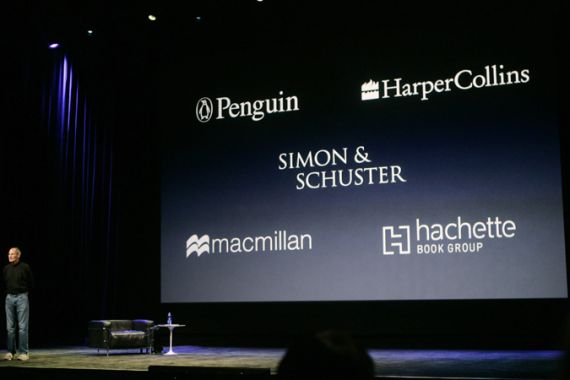US court says Apple took part in price fixing
A district court judge says Apple conspired with publishers to drive the price of e-books up and eliminate competition.

In a sweeping rejection of Apple Inc’s strategy for selling electronic books on the internet, a federal judge has ruled that the company conspired with five major publishers to raise the retail prices of e-books.
US District Judge Denise Cote in Manhattan found “compelling evidence” that Apple violated federal antitrust law by playing a “central role” in a conspiracy with the publishers to eliminate retail price competition and raise e-book prices.
Keep reading
list of 4 itemsHong Kong’s first monkey virus case – what do we know about the B virus?
Why will low birthrate in Europe trigger ‘Staggering social change’?
The Max Planck Society must end its unconditional support for Israel
The decision, delivered on Wednesday, could expose Apple to substantial damages.
It is a victory for the US Department of Justice and the 33 US states and territories that brought the civil antitrust case.
Apple was accused of pursuing the conspiracy to undercut online retailer Amazon.com Inc’s e-book dominance, causing some prices to rise to $12.99 or $14.99 from the $9.99 that Amazon charged.
Amazon once held a 90 percent market share.
“Apple chose to join forces with the publisher defendants to raise e-book prices and equipped them with the means to do so,” Cote said in a 159-page decision.
“Without Apple’s orchestration of this conspiracy, it would not have succeeded as it did.”
Cote’s decision was not a total surprise, given that she indicated before the 2-1/2 week non-jury trial began on June 3 that Apple’s defenses might fail.
Cote ordered a trial to set damages.
“This result is a victory for millions of consumers who choose to read books electronically,” Bill Baer, head of the Justice Department’s antitrust division, said in a statement.
“This decision by the court is a critical step in undoing the harm caused by Apple’s illegal actions.”
Driving the market
In a statement, Apple maintained that the plaintiffs’ allegations are false and said it will appeal Cote’s decision.
“Apple did not conspire to fix e-book pricing,” Apple spokesman Tom Neumayr said.
“When we introduced the iBookstore in 2010, we gave customers more choice, injecting much needed innovation and competition into the market, breaking Amazon’s monopolistic grip on the publishing industry. We’ve done nothing wrong.”
Last year, Apple settled a separate antitrust case over e-book pricing with the European Commission, without admitting wrongdoing.
The alleged collusion began in late 2009 and continued into early 2010, in connection with the Silicon Valley giant’s launch of its popular iPad tablet.
Only Apple went to trial, while the publishers agreed to pay more than $166m combined to benefit consumers.
| Apple’s legal battles |
|
US government sues Apple in e-book scandal Amazon VP testifies on publishers ‘ultimatum’ Samsung scores victory against Apple |
In morning trading, Apple shares were down 30 cents at $422.05 on the Nasdaq.
Amazon’s strategy involved buying e-books at wholesale and then selling them at below cost, in an effort to promote its Kindle reading device.
Apple, in contrast, entered into so-called “agency agreements” in which publishers were able to set higher prices and pay commissions to the Cupertino, California-based company.
The federal government said this arrangement pushed Amazon into a similar model, and resulted in prices of e-books from the five publishers increasing by 18 percent.
Evidence in the case included emails from Apple’s late co-founder Steve Jobs to News Corp executive James Murdoch that the government said reflected Jobs’ desire to boost prices and “create a real mainstream e-books market at $12.99 and $14.99.”
Wednesday’s decision allows the plaintiffs to seek injunctive relief to prevent further pricing conspiracies.
At trial, the Justice Department said it wanted to block Apple from using the agency business model for two years.
The department also said it wants to stop Apple over a five-year period from entering contracts that insure it will
offer the lowest retail prices.
Apple on Tuesday dropped its lawsuit against rival Amazon for using the term “Appstore” for its online shop for mobile gadget applications.
“With more than 900,000 apps and 50 billion downloads, customers know where they can purchase their favourite apps,” an Apple statement said.
“We no longer see a need to pursue our case against Amazon.”